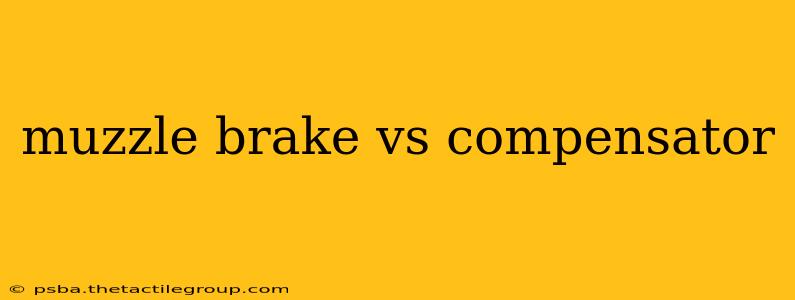Choosing the right muzzle device for your firearm can significantly impact your shooting experience. While both muzzle brakes and compensators reduce recoil, they achieve this through different mechanisms, leading to distinct advantages and disadvantages. This comprehensive guide dives deep into the core differences, helping you make an informed decision based on your specific needs and shooting style.
What is a Muzzle Brake?
A muzzle brake is designed primarily to reduce felt recoil. It accomplishes this by diverting propellant gases outward and upward, creating an opposing force that counteracts the recoil impulse. This results in a noticeably softer recoil, allowing for faster follow-up shots and improved accuracy during rapid firing.
How Muzzle Brakes Work:
Muzzle brakes typically feature ports angled outwards and upwards. The escaping gases create a counter-force that pushes the firearm downwards, reducing the vertical recoil component. Some designs also include ports angled to the sides, further mitigating recoil in multiple planes.
Advantages of Muzzle Brakes:
- Significant recoil reduction: This is the primary benefit, making them ideal for high-powered rifles and those with less experience handling recoil.
- Improved follow-up shot speed: Reduced recoil translates to quicker target reacquisition.
- Enhanced accuracy during rapid fire: By minimizing muzzle jump, you can maintain a better sight picture.
Disadvantages of Muzzle Brakes:
- Increased blast and noise: The redirected gases can create a substantial blast effect and increased noise levels, potentially affecting those nearby. This can be a safety concern at indoor ranges.
- More noticeable recoil impulse: While overall felt recoil is reduced, the initial recoil impulse can be slightly sharper due to the abrupt redirection of gases.
- Potential for damage to surrounding areas: The powerful gas blast can damage nearby equipment or surfaces.
What is a Compensator?
A compensator, often mistaken for a muzzle brake, is designed primarily to reduce muzzle rise. While it does offer some recoil reduction, its main function is to control the vertical recoil component, keeping the muzzle consistently on target.
How Compensators Work:
Compensators usually have ports angled upwards. These ports direct the escaping gases upwards, countering the rotational force that causes muzzle climb. This results in less muzzle rise and a flatter shooting trajectory, particularly during rapid firing.
Advantages of Compensators:
- Reduced muzzle rise: This is the primary benefit, improving accuracy and sight picture during rapid fire.
- Better sight picture maintenance: Less muzzle jump allows for faster follow-up shots with minimal target disruption.
- Generally less blast and noise than brakes: The design often minimizes the outward redirection of gases, resulting in less noticeable blast and noise compared to brakes.
Disadvantages of Compensators:
- Less recoil reduction than brakes: While they provide some recoil mitigation, it is generally less pronounced than with a muzzle brake.
- Potentially less effective with certain calibers or loads: Their performance can vary depending on the specific ammunition used.
Muzzle Brake vs. Compensator: The Key Differences Summarized
| Feature | Muzzle Brake | Compensator |
|---|---|---|
| Primary Function | Recoil Reduction | Muzzle Rise Reduction |
| Gas Direction | Outward and Upward (often sideways) | Primarily Upward |
| Recoil Reduction | Significant | Moderate |
| Muzzle Rise Reduction | Moderate | Significant |
| Blast and Noise | High | Lower |
| Best For | High-recoil firearms, rapid fire situations | Maintaining sight picture during rapid fire |
Conclusion: Choosing the Right Muzzle Device
The choice between a muzzle brake and a compensator depends entirely on your individual priorities. If minimizing felt recoil is paramount, a muzzle brake is the better choice. If maintaining a consistent sight picture during rapid fire is your primary concern, a compensator is more appropriate. Consider your specific shooting style, firearm, and ammunition when making your decision. Remember that both devices can impact your shooting environment, so be mindful of the increased noise and potential for blast damage.

